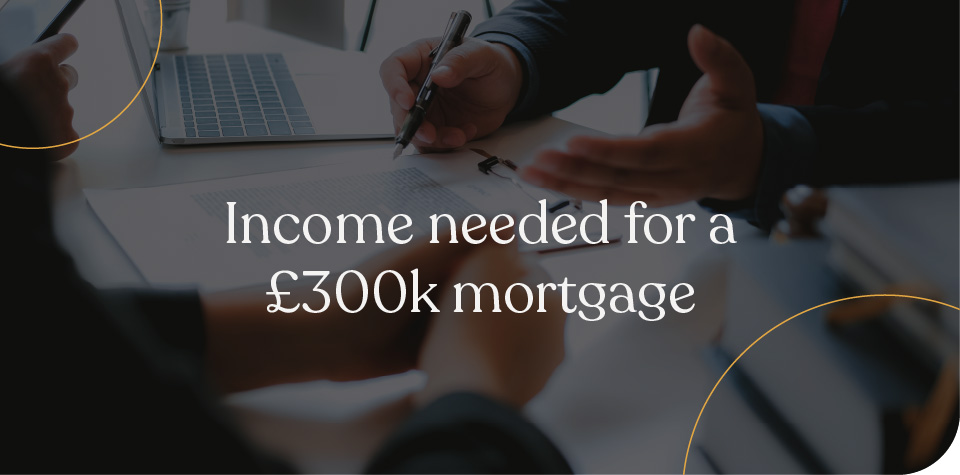
What income is needed for £300,000 mortgage? Find out here:
Many of our customers are concerned about mortgage affordability, with average house prices in the UK at around £280,000 and higher in the southeast.
If you’re looking for a mortgage, contact us below for free advice:
Get started online
How to work out the income for £300,000 mortgage deals:
Use our mortgage affordability calculator below for information about how much you can borrow, what the costs are and which deals you might be eligible for.
Prospective buyers almost always have a key figure in their heads. This could be because they have seen the property or the area’s house prices.
Speaking to a mortgage broker will help you understand if you can afford a £300,000 mortgage.
All mortgage lenders have different lending criteria, we will make sure you match the specialist lenders eligibility. Get a £300,000 mortgage quote below:
Get started online
What is the minimum income required to get a £300,000 mortgage loan?
Lenders vary regarding how much income they require for a £300,000 mortgage.
Some lenders will only take your regular PAYE salary into account, while others will also factor in bonuses and commissions. Self-employed borrowers will need to prove their income using accounts or HMRC tax statements.
Lenders will also carry out an affordability assessment that looks at both your income and outgoings. This means that if you have significant debts or dependents, it could impact how much you can borrow.
Lenders will typically calculate how much you can borrow by multiplying your income by four-and-a-half or five times. Some lenders will offer more than this.
Get started online
How much deposit is required to get a £300,000 mortgage loan?
The size of your deposit is a key factor in determining the amount you can borrow and how much your mortgage will end up costing.
A higher deposit will increase your chances of getting a £300,000 mortgage. This will allow you to access the most competitive mortgage rates on the market.
You can still get a mortgage with a 5% or 10% deposit, but this will be at a higher interest rate.
Get started online
What is the minimum deposit required to get a £300,000 mortgage loan?
Mortgage lenders will set a maximum loan-to-value (LTV) for each mortgage product. This is how much of the property’s value you can borrow as a mortgage. The remaining amount will be the deposit.
For example, a mortgage with a maximum LTV of 90% will require a 10% deposit, while a mortgage with a maximum LTV of 70% will need a 30% deposit.
A 10% deposit of £300,000 is £30,000, while 30% is £90,000.
Lenders normally require at least a 25% deposit for a buy-to-let mortgage.
The larger the deposit you have, the better the mortgage rates you’ll have access to.
You’ll also have more equity in your home so it’s a good idea to put down a larger deposit if you can.
Get started online
Interest Rate
The interest rate you pay on your mortgage will impact how much your monthly payments will be.
If you have a variable rate mortgage, the interest rate may change during the term. This will mean your payments will go up. If you have a fixed rate mortgage, the interest rate and your monthly payments will remain the same for the duration of the fixed rate which is normally two or five years.
Mortgage Term
Your monthly payments will be affected by the length of your mortgage term. The longer the mortgage term, the lower your monthly payments will be. However you will pay more interest overall.
Get started online
Repayment vs interest-only
Your monthly payments will be lower if you opt for an interest-only mortgage. You only pay the interest each month on an interest-only mortgage, and not the capital, so your payments will be less. However, at the end of the term you’ll still owe the amount of money you originally borrowed.
A repayment (capital and interest) mortgage means that you will have to repay both the capital and the interest each month. Therefore, your monthly payments will be more. But at the end of the term you’ll own the property outright.
Get started online
Why is affordability so important?
A lender will ask you how much you earn when assessing your mortgage application. This is an indicator of your ability to pay your monthly repayments.
Many lenders will lend you between 4 and 4.5x your annual income. If you apply for a joint mortgage, you will need to have a combined income of at least £66,667 to £75,000 to get a £300,000 mortgage.
Lenders will also look at your ability to pay your bills. This number is calculated by working out your monthly outgoings as a percentage of your monthly income. It is expressed in percentages. Healthy affordability is less than 36%.
If you earn £6,500 per month, either jointly or individually, and spend £2,100 on your expenses, your affordability would be 32.3%. Lenders may stress-test your ability to afford your mortgage payments before making a final decision.
Is it possible to get a £300,000 mortgage if you have credit problems?
Lenders will look at your credit history when you apply for a mortgage.
If you have had credit problems in the past, or have a poor credit score, you’ll find it more difficult to get a mortgage and may be charged a higher interest rate.
You can find more information in our Bad Credit Mortgages section. You can also contact us for free mortgage advice to discuss your credit history.
Is it possible to get a £300,000 loan for retirement?
If you’re close to retirement, you’ll find it more difficult to get a £300,000 mortgage.
Some lenders place a limit on the maximum age a borrower can be at the end of the mortgage term.
Lenders are concerned that you will no longer be able to pay the monthly mortgage payment if you retire.
Many lenders have removed their maximum age requirements in recent years to allow retired borrowers to get mortgages.
Get started online
What is the minimum income required to get a mortgage for £300,000 on a buy-to-let property?
To be eligible for a mortgage buy-to-let lender, you will need to make a minimum of £25,000 a year.
To determine how much they would be willing to lend, most lenders will look at the amount the property will generate in rental income. But they will also expect you to have a personal income of at least £25,000.
Most lenders expect the rental income to be at least 125% of the monthly mortgage payments.
Get started online

